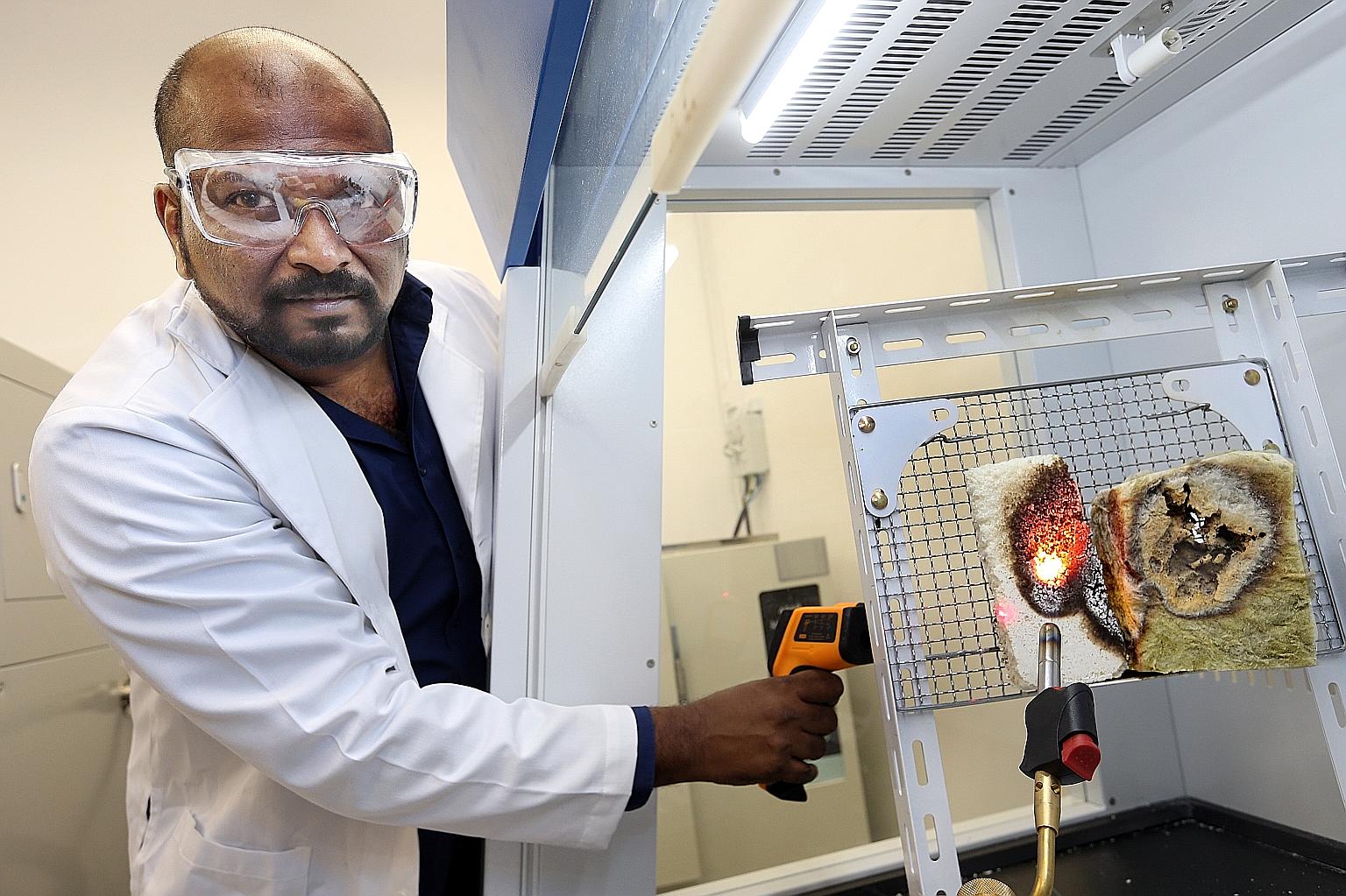Super foam developed by NTU is more soundproof, heat-resistant
AeroSil to go into mass production here by 1st half of 2017; it's more eco-friendly to produce
Sign up now: Get ST's newsletters delivered to your inbox

Dr Mahesh demonstrating the fire resistance of NTU's newly developed foam (left) over conventional insulating material (right) when put under a blowtorch flame at almost 2,000 deg C. NTU's innovation and enterprise arm NTUitive has filed a patent for the product.
ST PHOTO: LAU FOOK KONG
A new foam material that is stronger, more heat-resistant, more soundproof and more waterproof than existing products - and more environmentally friendly in its manufacture - may be about to shake up the market for insulating materials in industries ranging from construction to aerospace.
Developed by Nanyang Technological University (NTU) scientists over four years and licensed in May this year to Singapore-based design and manufacturing firm Bronx Creative & Design Centre (BDC) in a $7 million joint venture, the Bronx AeroSil foam will go into mass production in Singapore by the first half of next year. The production plant will serve clients in the automotive, electronics and oil and gas sectors in Singapore, Vietnam and the Middle East.
AeroSil's main ingredient is an ultra-light silica-based material called an aerogel, first created back in 1931. Due to microscopic pores, it is 99 per cent air.
By itself, the aerogel is brittle and not very useful, but Associate Professor Sunil Chandrankant Joshi and his then PhD student Mahesh Sachithanadam at NTU's School of Mechanical and Aerospace Engineering figured out a way to "season" it with a mix of additives that gives it strength and special properties. One of the additives is carbon nanotubes, which alter the foam's structure, making it highly water-repellent, absorbing less than 10 per cent water.
BDC said AeroSil has more than twice the thermal insulating power of conventional insulating foam. It also has superior sound-proofing properties. For example, in order to reduce the noise level generated by a passing truck to that of a conversation between two people, only 15mm-thick AeroSil would be needed, compared to 25mm of regular foam. NTU's innovation and enterprise arm NTUitive has filed a patent for the product.
Dr Mahesh, now BDC's chief technology officer, yesterday demonstrated the fire resistance of AeroSil at the firm's laboratory in Paya Lebar. After a couple of minutes under an almost 2,000 deg C blowtorch flame, a big hole was burnt in a sample of normal insulating material, while the reverse side of the unbroken piece of AeroSil continued hovering around 25 deg C.
The new product is also environmentally friendly to produce. While the production of conventional foams may require the use of acidic and alkaline solvents and generate gases like ammonia and carbon monoxide, the new foam uses water and does not generate any gas, said Dr Mahesh. It is also green in another way: By insulating vehicles and buildings more effectively compared to normal insulating materials, AeroSil could reduce the energy consumed by air-conditioning.
BDC research and development director Thomas Ng said: "With global industries moving towards green manufacturing and a lowered carbon footprint, the new foam ... will help address their needs and yet give a better performance."
BDC is negotiating with firms to expand production to India and other South-east Asian countries in the next few years. There are hopes to take it beyond Asia, with discussions under way with potential clients in Europe and the United States.
"We are now refining the product to bring it down to a competitive price while maintaining the same insulation and sound-proofing standards," said Dr Mahesh.
US market research consultancy Grand View Research estimated the global aerogel market at more than US$350 million (S$498 million) in 2014 and said in its report that the market is expected to grow to US$1.92 billion by 2022.


